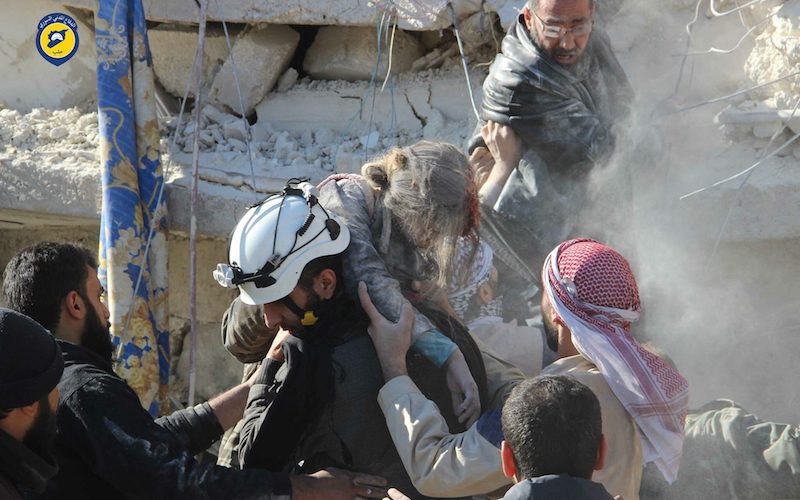
The Fall of Aleppo: What Does it Mean for Assad’s Regime?
Until November 27th, the balance of power in the Syrian civil war was unclear as all involved parties had not shown any significant progress over the previous sixty-seven months. The situation is worse in the besieged city of Aleppo, which has been divided since 2012 into two main fronts – pro-Assad forces and rebellion groups. On November 27th, the last resistance point in eastern Aleppo fell following a ferocious ground assault and aerial bombardment of pro-Assad forces, who now control up to one-third of rebel-held east Aleppo.
Eastern Aleppo with 250.000 trapped citizens suffers from lack of electricity, water supply, and medications. The city was almost reduced to rubble by endless air strikes by Russian backed pro-Assad forces.
Following the latest success, Assad’s army will probably advance further to seize Sahur, Haydariyya, and Sheikh Hodr districts in order to divide Eastern Aleppo into two parts, which will cut off the communication lines between eastern opposition forces and the main battle group deployed in Bab-al-Nayrab. The army and its allies claim to have taken full control of the Jabal Badro and Baadeen districts on Sunday, a day after capturing Hanano, a neighboring residential district. Thus, the recapture of Aleppo by government troops is only a matter of time.
The latest successful advancement of Assad forces will be a major turning point in Syria’s six-year old civil war. Undoubtedly, such an unexpected turning point represents a substantial shift in the status-quo between Assad’s regime and opposition groups. Moreover, it is safe to assume that the final battle for Aleppo will no doubt have consequences in other parts of Syria, namely Damascus, Hama, and the south. So, why are the opposition forces losing ground after four years of resistance? The key factor is the presence of Russian military power in Syria since 2015. Another factor is the absence of a common strategy and consensus inside the opposition alliance forces – Fath-al-Halab. Contradictions developed among rebellion groups in Idlib and Aleppo after the so-called rebranding of Jabhat-al-Nusra front (the most powerful organization) which attempted to rekindle relations with moderate opposition forces. As a result of this policy, many radical Islamists, in particular pro-Turkish militants from the Nusra front have fled Aleppo.
Local rebel groups look for military assistance from Turkey, which has been one of the main backers of rebel groups. However, Ankara seems to be reluctant to support rebel groups in Aleppo, as it is mostly concentrated with securing its own borders from the Kurdish militia, and preventing them from capturing territory. Therefore, the Turkish army launched a mass offensive to seize the strategically important city Al-Bab (one of the few remaining ISIS strongholds), that will separate Kurdish enclaves in Syria and may lead to the liberation of ISIS held Raqqa. After taking Al-Bab, the Turkish military says its objective is to clear the whole area and retake the town of Manbij from the SDF, the large Kurdish militia.
The rapid government advancement in Aleppo demonstrates that Assad still maintains mobilization capability. It should be noted that the latest military operations in Aleppo have been carried out without the active participation of Russian air power. Whereas air power supports ground troops across Aleppo, Russia preferred not to be actively involved in the bloodshed in Aleppo due to the harsh criticism from the world community over previous deadly air strikes.
Considering the military activities of various Islamists, Turkey, and Kurdish militia in Syria, Assad’s troops with the support of Russia will try to capture the northern capital in 2017. Obviously, the mission will be much easier now, as the Turkish army is mostly dealing with Kurdish forces in the north rather than assisting opposition forces and Islamist groups in Aleppo. However, the seizure of eastern Aleppo symbolically means a victory for government troops (as was the case in Palmyra), but, in reality, it is still insufficient to change the situation in favor of Assad’s regime.
Needless to say the only solution for the Syrian crisis is the division of the country into several zones of influence. Probably, global powers will support that plan but undoubtedly the consequences of the solution will be devastating. The only important unanswered question for Assad, Turkey and the Kurdish militia will be who will take control of the ISIS held territories in Syria? The question suggests that all involved parties should prepare for the offensive to capture the Islamists’ capital, Raqqa.

